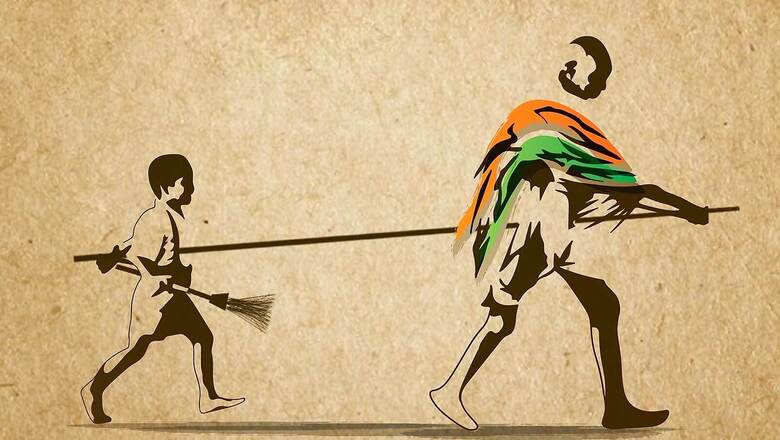
views
Mahatma Gandhi’s dream was to see an open defecation free India and he had made cleanliness a practice of his daily life. He believed that a cleaner living condition and improved sanitation practices will keep all healthy and help India fight many evils. He advocated that “sanitation was more important than independence”.
Gandhiji realised early that India must get rid of the poor state of sanitation and build an adequate number of toilets for its citizens.
Gandhi Ji also thought of hygiene and sanitation as a way of eliminating the caste system. “Unless we rid ourselves of our dirty habits and have improved latrines, Swaraj can have no value for us,” he said.
He struggled all his life for sanitation and cleanliness. In South Africa, where he spent over two decades, Gandhiji saw how the European settlers would ask Indians to live in separate locations because they did not follow sanitation habits and hygiene practices. Though he argued that Indians would be equally sanitary if they are given adequate attention, he knew the assertion was not without merit. Once, after seeing dirt and waste around the Kashi Vishwanath temple in Varanasi, he asked whether or not it “reflected our own character”.
Gandhiji took to scavenging himself in South Africa and often wrote how Indians were careless with public toilets and littered open spaces with filth. After returning to India, he turned sanitation into a movement by mobilising people and educating them. He asked them to clean their own toilets and not to treat those who do this work as untouchables.
Inspired by this Gandhian vision of a clean and prosperous India, the government launched the Swachh Bharat Mission (SBM- Gramin) on 2 October 2014 on his birth anniversary. The country achieved unprecedented success in terms of providing access to safe sanitation. Launched with an aim of making rural India open defecation free, the world’s largest sanitation drive was inspired by the vision of Mahatma Gandhi.
On the 150th birth anniversary of the father of the nation, in 2019, rural India was declared 100 percent open defecation free.
The initiative has expanded over the years. The second phase Swachh Bharat Mission (Urban) 2.0, aims to sustain the gains of the first phase and emphasises on solid waste management and cleaning our water sources. The second phase of SBM also focuses on sustaining the progress made in the first phase through behavioural change and safe sanitation practices.
Consuming contaminated water may cause water-borne diseases like viral hepatitis, typhoid, cholera and diarrhea. According to the latest National Family Health Survey-5 (2019-2020), more children under the age of 5 suffer from diarrhea than those in cities. This higher prevalence of diarrhea in rural areas is believed to be caused primarily by contaminated water and food consumption. Polluted water also compromises personal hygiene and causes eye and skin infections. Access to clean water and safe sanitation, in line with Gandhiji’s vision of sanitation for all, can help to overcome many health issues. In order to improve overall health outcomes, it is imperative that we start acting towards sustainable sanitation goals.
Mission Swachhta Aur Paani, a News 18 and Harpic India initiative, advocates the availability and usage of clean water and safe sanitation for all. Let’s all come together and join hands for Mission Swachhta Aur Paani- Mil Kar Lein Ye Zimmedari to ensure sustainable and inclusive sanitation.
A grand Telethon will bring together government representatives, celebrities, artists, change makers, policy experts and youth icons to celebrate the cause on the occasion of World Toilet Day on November 19.
Watch the telethon LIVE on November 19, 12 pm onwards at: Mission Swachhta Aur Paani
Read all the Latest News here
















Comments
0 comment